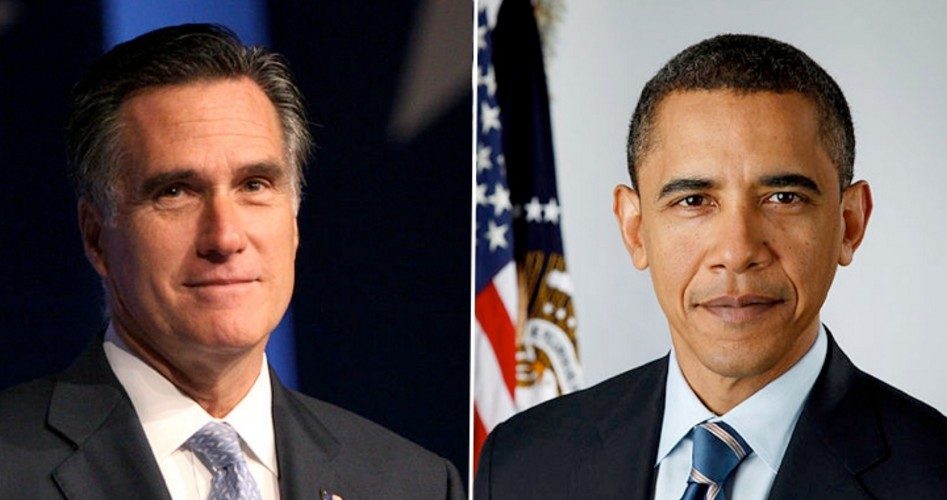
A study by two University of Colorado professors released last month predicts that President Obama will win just 218 Electoral College votes in November, far short of the 270 that he needs for reelection. Said political science professor Kenneth Bickers: “Based on our forecasting model, it becomes clear that the president is in electoral trouble.”
Co-author Michael Berry added,
For the last eight presidential elections, this model has correctly predicted the winner.
The economy has seen some improvement since President Obama took office. What remains to be seen is whether voters will consider the economy in relative or absolute terms. If it’s the former, the president may receive credit for the economy’s trajectory and win a second term. In the latter case, Romney should pick up a number of states Obama won in 2008.
The model looks at a number of elements, the most important of which are unemployment numbers and personal disposable income. According to the authors, voters hold Democrats more responsible for high unemployment rates while they hold Republicans more responsible for lower spendable incomes. Specifically, said Berry:
The apparent advantage of being a Democratic candidate [while] holding the White House disappears when the national unemployment rate hits 5.6 percent …
The incumbency advantage enjoyed by President Obama … is not great enough to offset [the] high rates of unemployment …
Their analysis also looks at each individual state and arrives at another conclusion which impacts the Electoral College vote: Obama will lose almost all of the “swing” states, including North Carolina, Virginia, New Hampshire, Colorado, Wisconsin, Minnesota, Pennsylvania, Ohio, and Florida, according to Bickers.
As always there are caveats: The economic data the professors used in their study was from June, and an update of their model coming in September might change their conclusions. And some of the “swing” states that are barely favoring Romney at present could also change in their updated report.
This presidential prediction mirrors that of Wayne Allyn Root, who reiterated his prediction in June that Romney would beat Obama in November by a landslide.
Root was a professional odds-maker in Las Vegas with an excellent record of calling political outcomes. But he doesn’t use any fancy mathematical models: “I simply use common sense to call them as I see them … today I am even more convinced of a resounding Romney victory.”
Root reviewed various voting blocs that went heavily for Obama in 2008 and sees his support eroding, some seriously, in each:
Black voters: “Obama has nowhere to go but down.”
Young voters: “Believers [in Obama] … have graduated into a job market from hell.”
Catholic voters: “Obama won a majority of Catholic voters in 2008. That won’t happen again.”
Suburban moms: “Obama’s economy frightens these moms. They are worried about putting food on the table.”
Military veterans: “McCain won this group by 10 points in 2008. Romney is winning by 24 points.”
Jewish voters: “I predict that Obama’s support [here] drops from 78% to the low 60s this year.”
On the other hand, Intrade, an Internet wagering site located in Ireland, has consistently shown President Obama leading Republican candidate Romney in the upcoming elections. Intrade allows individuals to invest in future outcomes — in that sense it is a “futures” market — and if they are correct, they profit from their predictions. So it’s more than a telephone poll; it’s a serious financial bet on an outcome.
Intrade opened for business in 2001 to allow betting on sports events and on the Dow Jones Industrial Average. In 2004 it began allowing investors to bet on political outcomes, and gained international attention when, in 2008, it not only correctly predicted the election of President Obama, it also predicted that he would receive 364 Electoral College votes. He received 365.
Ian Saxon, a student completing his requirements for a Master of Science degree in Economics at the University of Nottingham, looked into Intrade in depth and found it to be uncannily accurate. He wrote that, based on
a total of 300 days of political polling data and 1,981 days of Intrade.com market data [I found that Intrade’s] market prices tend to be superior predictors of the ultimate winner of the two Democratic presidential nomination contests [in 2004 and 2008]…
Market prices tend to be better predictors of political event outcomes than corresponding polls. This superiority was observed over all time periods studied, with Intrade market prices correctly predicting the winner 36% of the time in the 2004 Democratic presidential nomination contest (compared to 13% for polls) and 54% of the time in the 2008 Democratic presidential nomination contest (compared to 45% for polls).
At the moment Intrade is predicting that President Obama has a 60 percent chance of being reelected, and will capture 303 Electoral College votes in the upcoming election.
Rasmussen had the highest rating among the 15 polling services which tracked the 2008 election and, at present, it shows Obama and Romney in a dead statistical heat.
It all comes down, then, to how well the economy is perceived by voters to be doing the week before the election, how much of an impact the national unemployment rate is affecting them individually, and how they are feeling about their own personal financial well-being. All other political rhetoric and vitriol is likely to have little additional significant impact.



